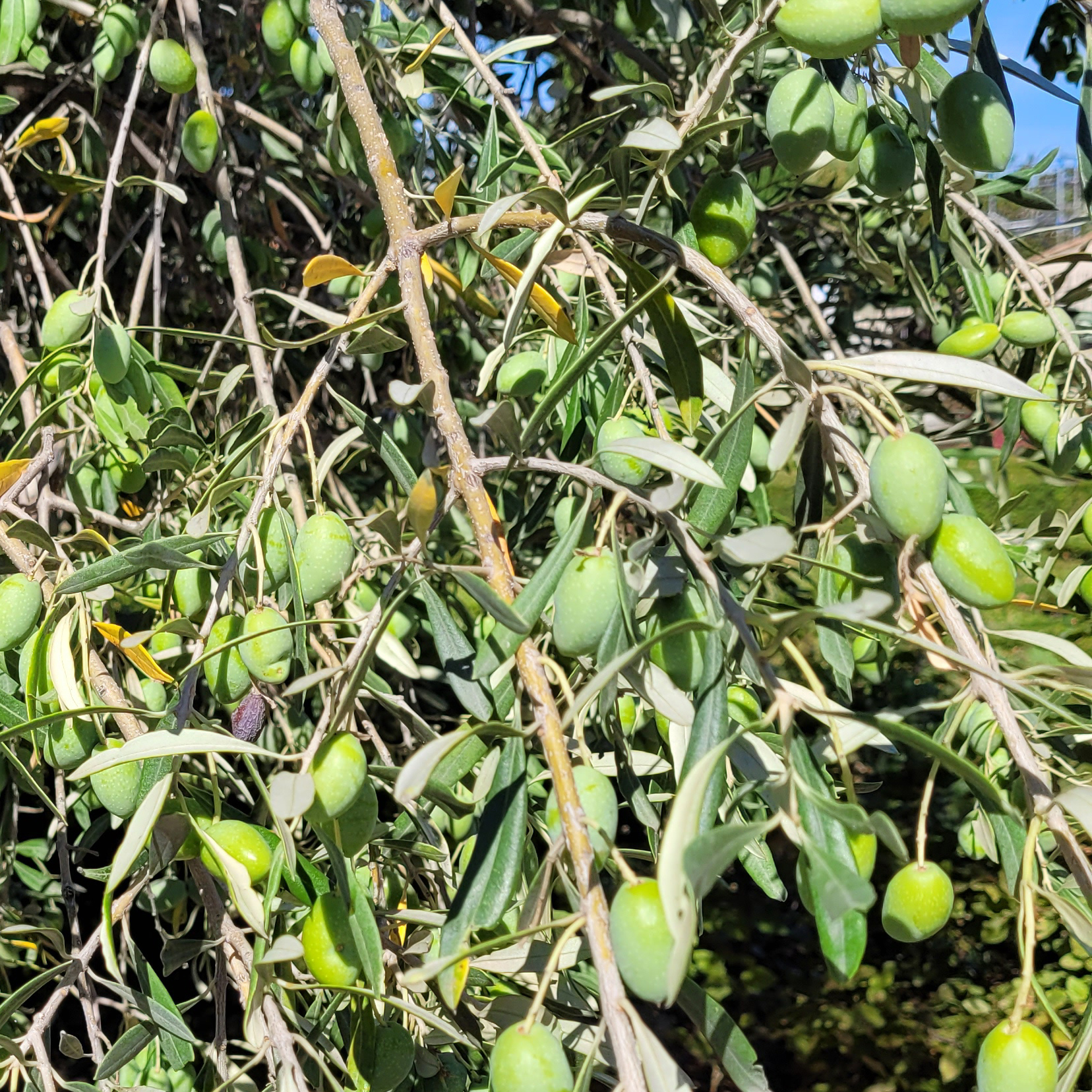This Tu B’shvat, we at Olamim are thinking about family, diaspora, community life, and one of the seven species in particular, the olive.
Olamim, an Innovation Hub of Be’chol Lashon, is a Latin Jewish learning community for families and individuals. Through education, research, and cross-community partnerships, we generate greater access to heritage language and culture, bridge diverse communities, and create a foundation for Latin inclusion and belonging in Jewish communal life.
Olive, Zayit, Zeytoon, Aceituna. Passed through so many places where we have, too. Pressed or cured, not as we are, but as we could be.
Born from rains.
Imagine, so many rains, and you, on the primordial ark, weathering the biggest storm of all times. The deluge. The flood. And inside, chaos. Trunks, paws, claws, beaks, wings, antennas, roaring, hissing, groaning, buzzing. And you, you have to rise to the occasion. Because you are in charge, or maybe, because no one is truly in charge? Unclear.
Finally, the trip trap of drip drop slows and a new air enters through the only window up top, filling this crass but crucial container of life, maybe all life. Too afraid to peer out and face the immensity of the sea, and all she took with her, all that lays waste below, you send a winged one. Crow. She circles and returns. There is nothing left.
Maybe there is something, maybe further out there. It doesn’t feel like it. You send a dove. It’s been so long since you saw her. Unclear.
An olive branch. That’s what she brings. A rainbow appears, a promise that the world will never be destroyed again, that way.
It said that this olive branch was from the same tree that produced that cruze of oil that rededicated the Menorah thousands of years later, after the destruction of the Second Temple. Olive trees can live a very long time. They show up when we think all is lost. And we eat them, we light with them, we anoint ourselves, we cure ourselves with them, not as they are, but as they could be
Another boat. Another expanse of water. This time not roaring or hissing, but shushing, and joking, crying and singing, in tongues of the old world. The old world is also gone. Truly. No one who stayed back there survived. At all.
Veracruz. The Port of Vera-cruz, Mexico. This place named for the cross upon which a Jew was tortured, brought in hundreds of thousands of Inquisition-era crypto-Jews, 20th century Eastern European Yidden, and Ottoman Djudiyos, off a boat and to a new home.
This last year, I travelled back to my birthplace, Mexico City, to celebrate with my five year old daughter, and 140 other Jinich family members, 100 years since our family arrived in Mexico. In great gratitude.
We visited places I’d never seen before, retracing my ancestors steps through tenements, walkways, and cultural centers where they debated Bundism vs. Zionism, and ran fundraisers for the first two Jewish institutions, a Jewish Cemetery, to care for the past, and a Jewish school, to care for the future.
These ancestors of mine, who were barely learning Spanish, didn’t waste a moment to build what they needed to thrive. They cared so much for what they were, Jews from a distant place, but even more so for what they could be, Mexican Jews.
It is said that we Jews are like an olive – when you press us, fine things come.
It’s not easy to be grace under pressure. In the past several months, many of us have felt put back on that ark, on that boat, between worlds, isolated and alienated from what we thought was a larger web of life. Unable to hear anything more than total chaos, and seeing an expanse of silence and indifference.
We all build boxes to keep us afloat in floods. We have to. It’s too scary. The important thing is where we are able to land, and rebuild. I’m still waiting for that dove to return with that fateful olive branch, a symbol of wholeness and peace.
And in the meantime—literally the season between Sukkot and Tu B’shvat– it’s been olive pressing time. Time to be refined. Refined in our thinking, refined in our responses, refined in where we place our Spirit, and where we place our resources.
 In considering an olive-based, Jewish dish, I came upon “Gefilte Fish a la Veracruzana” a traditional Mexican Ashkenazi Jewish dish. This mode, “A la Veracruzana” – is a traditional Mexican topping on fish, local to the Veracruz area. This recipe is from my dear aunt, Pati Jinich, who is the phenomenal chef behind “Pati’s Mexican Table” on PBS. Though she has a background in inter-American affairs, she’s said that she’s been able to do more for Mexico -US relations through food diplomacy. Though olives are not native to Mexico, they too came on a boat through the same port our family came through, the Port of Veracruz, and became a part of Mexican cuisine, a staple of the Lebanese Christian and Jewish communities alike.
In considering an olive-based, Jewish dish, I came upon “Gefilte Fish a la Veracruzana” a traditional Mexican Ashkenazi Jewish dish. This mode, “A la Veracruzana” – is a traditional Mexican topping on fish, local to the Veracruz area. This recipe is from my dear aunt, Pati Jinich, who is the phenomenal chef behind “Pati’s Mexican Table” on PBS. Though she has a background in inter-American affairs, she’s said that she’s been able to do more for Mexico -US relations through food diplomacy. Though olives are not native to Mexico, they too came on a boat through the same port our family came through, the Port of Veracruz, and became a part of Mexican cuisine, a staple of the Lebanese Christian and Jewish communities alike.
As you enjoy it, I invite you to consider gratitude for the voyages of our people, and the internal fortitude and divine grace that enables us to rebuild in peace, that carries us from one generation to the next, for we are not just “banim” children of what is, but “bonim” builders of what is possible.
From Olamim to you, and on behalf of all our families, Feliz Tu B’shvat!
Ariela Ronay-Jinich
Founder and Executive Director of Olamim, Latin Jewish Belonging for Families









